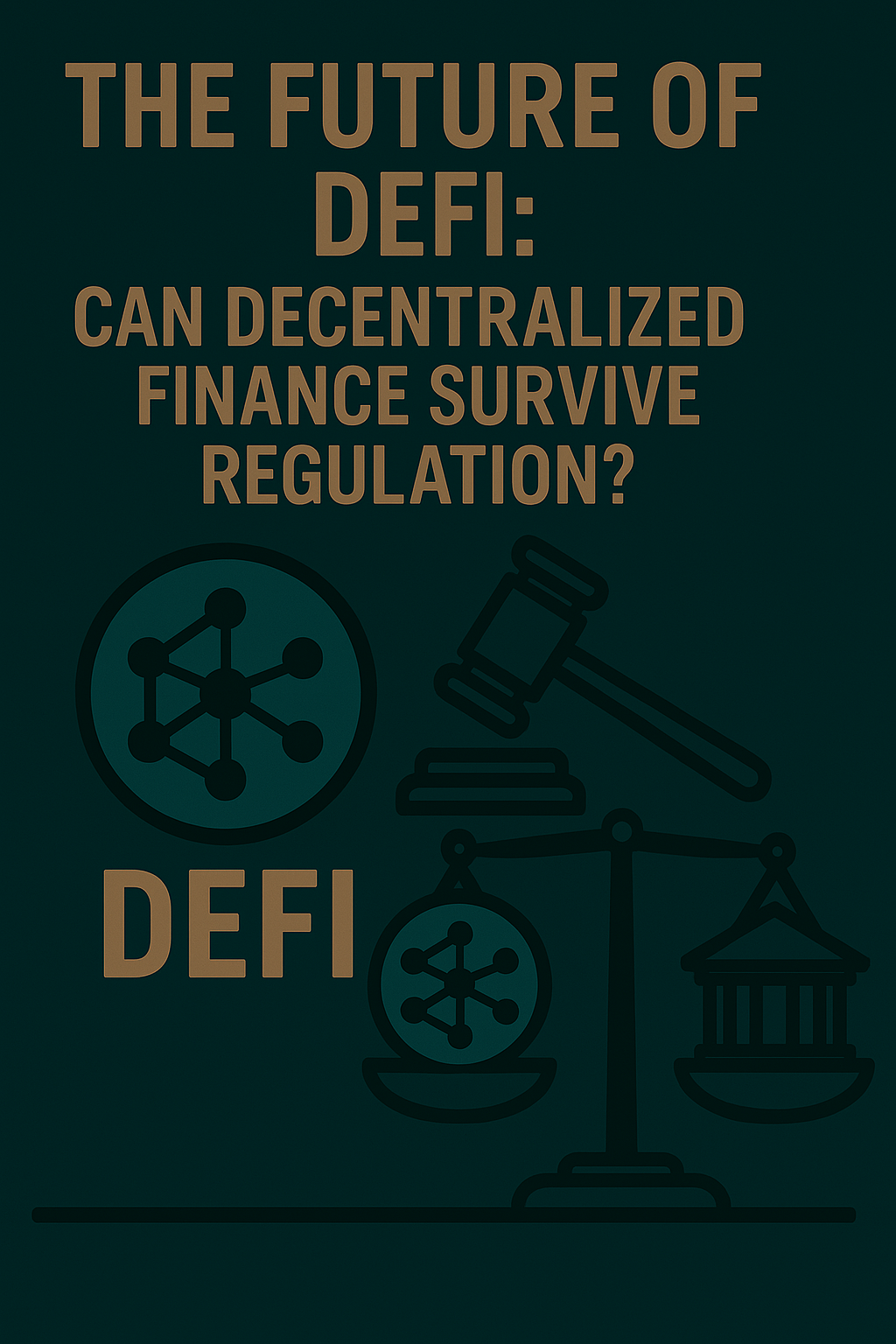Introduction
Decentralized Finance (DeFi) has emerged as one of the most transformative innovations in the financial sector, offering a decentralized alternative to traditional banking systems. Built on blockchain technology, DeFi promises financial inclusivity, transparency, and autonomy, empowering users to trade, borrow, and lend without intermediaries. However, as the sector grows, governments and financial regulators worldwide have begun imposing stricter rules on the industry, raising concerns about DeFi’s survival amid increasing scrutiny.
Can DeFi adapt to regulatory pressures while maintaining its decentralized nature, or will compliance force the industry into centralization? This blog explores the future of DeFi, examining regulatory threats, potential solutions, and whether decentralized finance can continue thriving in an era of heightened oversight.
Understanding DeFi’s Core Principles
What Is DeFi?
DeFi encompasses blockchain-based financial applications that operate without centralized institutions such as banks. Instead, smart contracts—self-executing contracts coded on blockchain networks—facilitate transactions, eliminating the need for third-party intermediaries.
Common DeFi services include:
- Decentralized Exchanges (DEXs) (e.g., Uniswap, SushiSwap)
- Lending & Borrowing Platforms (e.g., Aave, Compound)
- Yield Farming & Staking (e.g., Yearn Finance)
- Stablecoins & Algorithmic Assets
By leveraging blockchain technology, DeFi provides users with financial autonomy, free from institutional control. However, these benefits have also challenged traditional regulatory frameworks, leading to increasing scrutiny from lawmakers.
The Regulatory Challenges Facing DeFi
While decentralization is at the heart of DeFi, the industry faces mounting pressure from regulators who argue that financial security, anti-money laundering (AML) compliance, and consumer protection must be prioritized. Here are the key regulatory challenges DeFi must address:
1. KYC & AML Regulations
Governments worldwide are enforcing strict Know Your Customer (KYC) and Anti-Money Laundering (AML) laws, demanding that DeFi protocols verify user identities to prevent illicit activities such as fraud and money laundering.
Challenges include:
- Anonymous Transactions – DeFi’s decentralized nature makes tracking illicit transactions difficult.
- Regulatory Gaps – Many DeFi protocols operate across borders, making enforcement complex.
- Privacy Concerns – Users fear KYC measures may compromise their financial autonomy.
2. Securities Regulations & Token Compliance
Many DeFi projects issue tokens, some of which regulators classify as securities. The SEC and other financial watchdogs have taken legal action against platforms offering unregistered securities, arguing that they must comply with traditional investment laws.
Regulatory hurdles include:
- Defining DeFi Tokens – Are they commodities, securities, or a new asset class?
- Compliance Burdens – Will DeFi projects need costly legal frameworks to continue operating?
- Impact on Innovation – Overregulation could stifle new DeFi projects, reducing market competition.
3. Decentralization vs. Regulation
One of the biggest dilemmas facing DeFi is whether it can remain decentralized while complying with regulations. Traditional financial institutions operate within centralized structures, following strict regulatory guidelines. DeFi, however, thrives on permissionless, open-source technology—two principles that contradict most existing financial laws.
Regulators may demand that:
- DeFi protocols register under regulatory authorities.
- Founders take responsibility for user safety and financial protections.
- Tax reporting & investor protections become mandatory, leading to centralized governance.
While regulation aims to protect investors, many fear that enforcing stricter laws will ultimately undermine DeFi’s autonomy, leading it toward centralization and defeating its original purpose.
Potential Solutions: Can DeFi Adapt Without Losing Its Decentralization?
Despite increasing regulation, DeFi projects are exploring ways to comply without compromising their core values. Several key adaptations are emerging to strengthen the industry while maintaining decentralization:
1. Decentralized KYC and Identity Verification
Instead of traditional KYC measures that require central oversight, blockchain developers are introducing decentralized identity verification solutions that protect users’ privacy while satisfying regulators.
Options include:
- Zero-Knowledge Proofs (ZKPs) – Allow users to verify their identity without revealing sensitive personal details.
- Decentralized Identity Protocols – Tools like Civic and SelfKey provide blockchain-based identity verification without centralized control.
2. Regulatory Sandboxes & Legal Clarity
To facilitate compliant DeFi growth, some governments are experimenting with regulatory sandboxes, allowing blockchain startups to test financial products under temporary exemptions. This approach offers:
- Flexibility for innovation while ensuring responsible practices.
- A bridge between regulators and DeFi builders to create better compliance solutions.
3. Hybrid Governance Models
Many DeFi projects now adopt DAO (Decentralized Autonomous Organization) governance, allowing the community to make decisions instead of a centralized entity. Some platforms have introduced hybrid governance models, balancing decentralization with legal oversight by:
- Implementing community-driven compliance measures.
- Establishing oversight groups that work with regulators while maintaining decentralization.
4. Layer 2 Solutions & Privacy-Preserving Technology
To mitigate regulatory risks, DeFi projects are integrating Layer 2 scaling solutions, enhancing security and scalability. Additionally, privacy tools like Tornado Cash alternatives enable secure transactions without complete anonymity, helping platforms align with AML policies.
The Future of DeFi: Coexistence or Centralized Takeover?
Optimistic Outlook: DeFi’s Continued Growth
Despite regulatory challenges, the DeFi sector is resilient, continuously innovating and adapting to legal frameworks without sacrificing its autonomy. If decentralized compliance solutions gain traction, DeFi can coexist with regulated financial markets, proving that decentralization doesn’t mean anarchy—it means a fairer financial system.
Pessimistic Outlook: Regulation Overpowers Decentralization
If governments implement restrictive laws, forcing DeFi protocols to comply with traditional banking regulations, DeFi could lose its decentralized appeal. Many projects may move toward semi-centralized financial models, mirroring banks rather than revolutionizing finance.
Conclusion: The Future Hinges on Collaboration
Can DeFi survive regulation? The answer depends on how well the industry adapts to compliance while defending decentralization. The key lies in collaboration—between developers, regulators, and users—to create a balanced financial system that fosters innovation without sacrificing security.
Decentralized Finance has the potential to reshape global finance, but its fate remains uncertain. As regulations evolve, the industry must decide whether to embrace compliance while defending decentralization, or risk being absorbed into traditional finance.
What do you think? Can DeFi thrive under regulation, or will compliance force it into centralization? Let’s discuss!
If you have been impacted by crypto fraud, contact Digital Defenders Group for assistance.

No responses yet